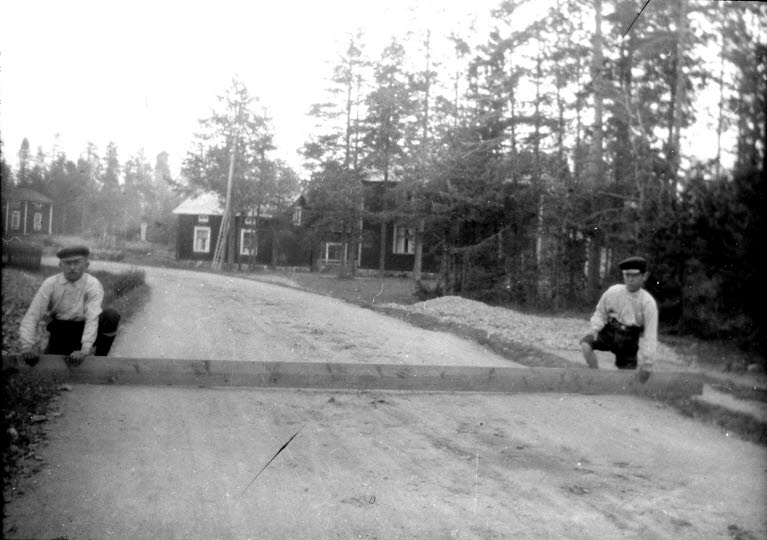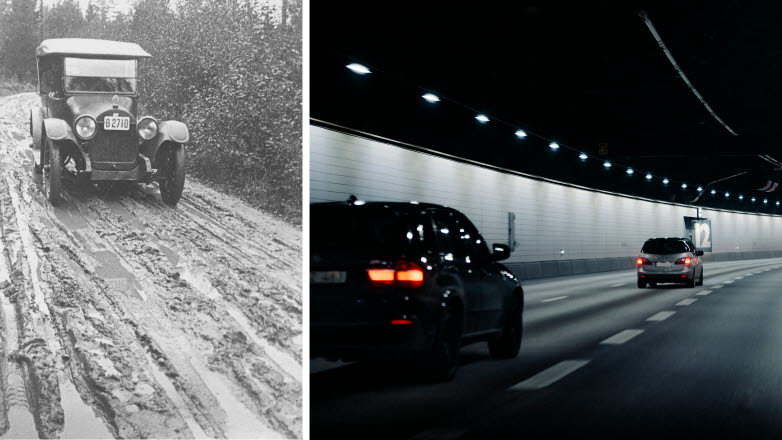From plank to laser - VTI celebrates 100 years of road technology research

The seeds of the research institute that is now the Swedish National Road and Transport Research Institute (VTI) were sown 100 years ago when the Royal Swedish Automobile Club of Sweden (Kungliga Automobil Klubben) started the KAK Road Institute. Road engineering research continues to be an important focus area, although many other transport-related disciplines have since been added to VTI's research portfolio.
Mudflows that ran down and clogged ditches, frost heaving that pushed boulders up into the road surface and dangerous potholes. These were some of the problems that led critics at the time to exclaim: Sweden can't afford bad roads!
As the number of motor vehicles increased, so did the knowledge of how to build roads. Gravel roads were replaced by roads with asphalt or concrete wearing surfaces. At the time, manual measurement of rut depth and crossfall was done with a plank. This has now been replaced by advanced laser technology which, together with georadar, will soon be able to measure everything in and around the road.
Cycling was a common mode of transport and the Government subsidised cycle paths in the 1930s. The car boom then led to a decline in cycling. Now the trend is again the opposite. Cycle paths are being expanded with the aim of encouraging more people to choose active travel, both to reduce car traffic and for health reasons.
However, the roadway needs to be sustainable in the long term, whether it is for cars or bicycles. This requires research to constantly develop the design.
VTI's 100th anniversary, with a focus on road engineering research, is a good opportunity to highlight all the Institute's outstanding researchers and research engineers in the field of road engineering. VTI also has advanced, world-class research equipment and an accredited laboratory for road engineering research.
Road engineering is the engineering science that deals with the technical properties of the road structure, and includes everything from the inventory of constituent conditions, from the project design of structure to the construction of the road. Road engineering research deals with how roads break down, and how road structures are built, reinforced, restored and maintained. This knowledge is crucial for coping with future stresses from traffic and, in particular, climate change.
Important aspects to consider in the research are also the road's environmental and climate impact, which comprises everything from the materials used in the road, to the use phase and finally what happens when the road is demolished or rebuilt.
Exactly when the Road Institute saw the light of day is shrouded in mystery. The proposal to establish the Road Institute was submitted to KAK in October 1922, which then led to a board decision in December of the same year. The Board then announced the direction of the KAK Road Institute in January 1923, that the Institute had been established, and its statutes were drawn up in March.
The starting point for VTI's 100th anniversary celebration of road engineering research was the Transport Forum conference, where the anniversary was celebrated with a film exposé and speeches by both Minister of Infrastructure and Housing Andreas Carlson and Director-General Tomas Svensson. In January, a new competence centre for road engineering was also established, in which VTI is a partner together with Lund University of Technology, Chalmers, KTH Royal Institute of Technology and Luleå University of Technology. And that was just the beginning of a year in which road engineering research will be the focus in many different ways.
The Road Surface Surveying Day will be held in Stockholm on 30 March. In Greece from 25 to 27 October, it is time for a 10-year anniversary with VTI as the organiser: the ERPUG (European Road Profile Users' Group) conference. The second issue of VTI's magazine VTI aktuellt has road engineering research as its theme, and researchers who are now taking the area into the next century will be highlighted a little extra during the year in VTI's communication channels. Stay tuned!
Text: Gunilla Rech
Translated by: CBG Konsult & Information AB

Don´t miss out on our news – subscribe now!
Stay informed with the latest research and news from VTI. Sign up for newsletters, sent by e-mail four times a year.
